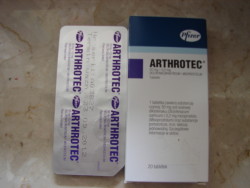 While Arthrotec may provide some welcome relief for arthritis patients with sensitive stomachs, it’s still among the many medications that can put a patient at risk for Stevens Johnsons syndrome.
While Arthrotec may provide some welcome relief for arthritis patients with sensitive stomachs, it’s still among the many medications that can put a patient at risk for Stevens Johnsons syndrome.
Arthrotec is a drug used to treat the symptoms of osteoarthritis and rheumatoid arthritis in patients who are at a high risk for developing stomach ulcers. It’s been available since first earning FDA approval in 1997.
The brand name Arthrotec refers to a combination of two drugs, diclofenac and misoprostol.
Diclofenac is a non-steroidal anti-inflammatory drug, or NSAID, that reduces substances in the body that can cause pain and inflammation. Misoprostol’s job is to prevent ulcers that might otherwise be caused by diclofenac, by reducing production of stomach acid and by replacing substances that make for a protective stomach lining.
Arthrotec Side Effects
As the drug’s warning information states, Arthrotec side effects can include a wide range of skin complications. Symptoms as diverse as acne, bruising, eczema, photosensitivity, and increased sweating have all been reported in conjunction with courses of Arthrotec.
On the more severe end of the spectrum, Stevens Johnsons syndrome and a related condition known as Toxic Epidermal Necrolysis are also known Arthrotec side effects.
Though these conditions are fortunately rare, when they do happen they can be extremely painful and damaging, and in some cases deadly.
The warning label says that Arthrotec patients are most susceptible to Stevens Johnsons syndrome early in their course of treatment. Most cases begin within the first month of treatment. Patients may be advised to discontinue Arthrotec at the first signs or symptoms of serious skin problems.
Stevens Johnsons syndrome is rare is most often a reaction to some kind of medication. It starts with symptoms that may be mistaken for those of the flu – symptoms like fever, cough, fatigue or sore throat.
Soon, the more characteristic symptoms of Stevens Johnsons syndrome set in:
- Skin: The trademark symptom of Stevens Johnsons syndrome is a rash that spreads over hours or days. Within these areas of rash, the top layer of skin ultimately dies and peels away. The loss of this outer layer of skin can expose the patient to infections that can lead to life-threatening complications like sepsis, a blood infection that spreads throughout the body. Sepsis itself can lead to shock or organ failure.
- Eyes: Early in the condition’s progression, the patient may feel burning in the eyes. This burning may progress into full-on inflammation that can lead to tissue damage and scarring that can leave the patient blind.
- Mucous membranes: The patient may also develop blisters on the mucous membranes that line the inside of the digestive and respiratory systems. These sores can affect the insides of the mouth and throat, making eating difficult. Similar sores may afflict the inside of the genitals or the large intestine, where they can cause diarrhea.
Treatment generally requires hospitalization. Where the condition is caused by a drug like Arthrotec, the first step is to discontinue that drug. Providers then generally focus on treating symptoms by dressing sores, replacing lost fluids and electrolytes, and preventing infection for as long as it takes for the body to heal itself.
Even after Stevens Johnsons syndrome resolves, it can leave permanent residuals. The skin that grows back may have abnormal coloring, texture or scars. Ongoing skin problems can cause hair to fall out or finger and toe nails to grow back abnormally.
Do YOU have a legal claim? Fill out the form on this page now for a free, immediate, and confidential case evaluation. The Stevens Johnson Syndrome attorneys who work with Top Class Actions will contact you if you qualify to let you know if an individual lawsuit or class action lawsuit is best for you. [In general, SJS lawsuits are filed individually by each plaintiff and are not class actions.] Hurry — statutes of limitations may apply.
ATTORNEY ADVERTISING
Top Class Actions is a Proud Member of the American Bar Association
LEGAL INFORMATION IS NOT LEGAL ADVICE
Top Class Actions Legal Statement
©2008 – 2025 Top Class Actions® LLC
Various Trademarks held by their respective owners
This website is not intended for viewing or usage by European Union citizens.
Get Help – It’s Free
Help for Victims of Stevens Johnson Syndrome
If you or a loved one were diagnosed with Stevens Johnson Syndrome (SJS) or toxic epidermal necrolysis (TEN) after taking a prescribed or over-the-counter medication, you may be eligible to take legal action against the drug’s manufacturer. Filing an SJS lawsuit or class action lawsuit may help you obtain compensation for medical bills, pain and suffering, and other damages. Obtain a free and confidential review of your case by filling out the form below.
An attorney will contact you if you qualify to discuss the details of your potential case at no charge to you.
Please Note: If you want to participate in this investigation, it is imperative that you reply to the law firm if they call or email you. Failing to do so may result in you not getting signed up as a client, if you qualify, or getting you dropped as a client.
Oops! We could not locate your form.












